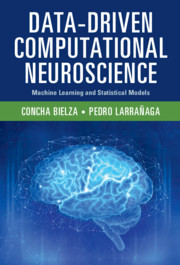Description
Data-Driven Computational Neuroscience
Machine Learning and Statistical Models
Authors: Bielza Concha, Larrañaga Pedro
Trains researchers and graduate students in state-of-the-art statistical and machine learning methods to build models with real-world data.
Language: English
Subject for Data-Driven Computational Neuroscience:
Approximative price 95.29 €
In Print (Delivery period: 14 days).
Add to cart
Publication date: 11-2020
708 p. · 18.5x25.9 cm · Hardback
708 p. · 18.5x25.9 cm · Hardback
Description
/li>Contents
/li>Biography
/li>
Data-driven computational neuroscience facilitates the transformation of data into insights into the structure and functions of the brain. This introduction for researchers and graduate students is the first in-depth, comprehensive treatment of statistical and machine learning methods for neuroscience. The methods are demonstrated through case studies of real problems to empower readers to build their own solutions. The book covers a wide variety of methods, including supervised classification with non-probabilistic models (nearest-neighbors, classification trees, rule induction, artificial neural networks and support vector machines) and probabilistic models (discriminant analysis, logistic regression and Bayesian network classifiers), meta-classifiers, multi-dimensional classifiers and feature subset selection methods. Other parts of the book are devoted to association discovery with probabilistic graphical models (Bayesian networks and Markov networks) and spatial statistics with point processes (complete spatial randomness and cluster, regular and Gibbs processes). Cellular, structural, functional, medical and behavioral neuroscience levels are considered.
Part I. Introduction; Section 1. Computational Neuroscience; Part II. Statistics; Section 2. Exploratory Data Analysis; Section 3. Probability Theory and Random Variables; Section 4. Probabilistic Interference; Part III. Supervised pattern recognition; Section 5. Performance Evaluation; Section 6. Feature subset selection; Section 7. Non-probabilistic classifiers; Section 8. Probabilistic classifiers; Section 9. Metaclassifiers; Section 10. Multi-dimensional classifiers; Part IV. Unsupervised pattern recognition; Section 11. Non-probabilistic clustering; Section 12. Probabilistic clustering; Part V. Probabilistic graphical models; Section 13. Bayesian networks; Section 14. Markov networks; Part VI. Spatial statistics; Section 15. Spatial statistics.
Concha Bielza is a professor in the Department of Artificial Intelligence at Universidad Politécnica de Madrid. She has published more than 120 journal papers and coauthored the book Industrial Applications of Machine Learning (2019). She was awarded the 2014 UPM Research Prize.
Pedro Larrañaga is a professor in the Department of Artificial Intelligence at Universidad Politécnica de Madrid. He has published more than 150 journal papers and coauthored the book Industrial Applications of Machine Learning (2019). He is fellow of the European Association for Artificial Intelligence and of Academia Europaea.
Pedro Larrañaga is a professor in the Department of Artificial Intelligence at Universidad Politécnica de Madrid. He has published more than 150 journal papers and coauthored the book Industrial Applications of Machine Learning (2019). He is fellow of the European Association for Artificial Intelligence and of Academia Europaea.
© 2024 LAVOISIER S.A.S.




